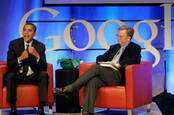This article is more than 1 year old
Google founder Sergey Brin promises to protect humanity from AI
The data-slurpingest, ad-slingiest exec of them all says he’s on your side
Google co-founder Sergey Brin has used his annual founder’s letter to raise the issue of ethics in AI.
Brin’s note to investors says “The new spring in artificial intelligence is the most significant development in computing in my lifetime”. He then gushed a bit about the stuff AI can do, declaring “we are truly in a technology renaissance, an exciting time where we can see applications across nearly every segment of modern society.”
“However, such powerful tools also bring with them new questions and responsibilities,” he added. “How will they affect employment across different sectors? How can we understand what they are doing under the hood? What about measures of fairness? How might they manipulate people? Are they safe?”
He didn’t add “Will they serve ads really well?” but did also mention drones and self-driving cars as technologies he thinks are making major changes.
He also promised that Google’s parent company Alphabet will consider the “legitimate and pertinent issues being raised, across the globe, about the implications and impacts of these advances.”
“This is an important discussion to have. While I am optimistic about the potential to bring technology to bear on the greatest problems in the world, we are on a path that we must tread with deep responsibility, care, and humility. That is Alphabet’s goal.”
There may be some sign of that humility in Brin's statement that the debate he outlined already means "Google must evolve its products with ever more care and thoughtfulness."
So many floating point operations
Brin also gave those who care about Google’s guts some numbers to gawp at.
“The Pentium IIs we used in the first year of Google performed about 100 million floating point operations per second,” he wrote. “The GPUs we use today perform about 20 trillion such operations — a factor of about 200,000 difference — and our very own TPUs are now capable of 180 trillion (180,000,000,000,000) floating point operations per second.)”
“There are several factors at play in this boom of computing,” he opined. “First, of course, is the steady hum of Moore’s Law, although some of the traditional measures such as transistor counts, density, and clock frequencies have slowed.”
The second factor is greater demand, stemming from advanced graphics in gaming and, surprisingly, from the GPU-friendly proof-of-work algorithms found in some of today’s leading cryptocurrencies, such as Ethereum.”
“However, the third and most important factor is the profound revolution in machine learning that has been building over the past decade. It is both made possible by these increasingly powerful processors and is also the major impetus for developing them further.”
So there you have it: we’re now building machines so they can build better machines while hoping that companies built on encouraging us to trade privacy for utility stay on the side of humanity.
Oh and for what it's worth Brin also said he's not sure that Alphabet's plan to "allow new applications of technology to thrive with greater independence" has worked. "While it is too early to declare the strategy a success, I am cautiously optimistic." ®

